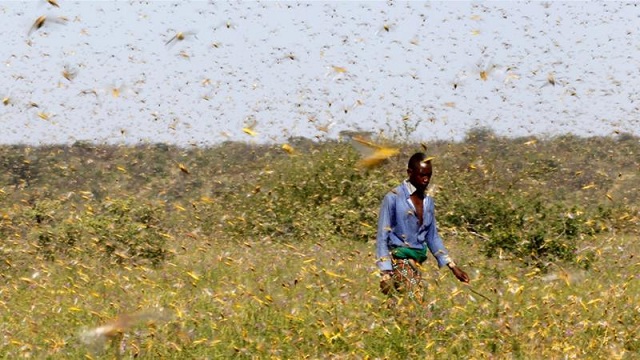
Karamoja, Uganda | THE INDEPENDENT | Districts in Karamoja are struggling to monitor the desert locust invasion due to limited financial resources. Following the invasion of the desert locust a week ago, Ministry of Agriculture Animal Industry and Fisheries directed local governments through their Production departments to do daily surveillance of the locust and report to the ministry.
However, URN has since established that the no district have received financial support to carry out the surveillance activity as required by the Ministry. As a result, districts are operating on their own budgets, which are deeply stretched.
Districts are struggling to conduct daily field visits, sensitisation of communities and monitor the movement of the locusts. Some of the Chief Administrative Officers interviewed by URN, say they lack capacity to facilitate teams for the daily visits to monitor the desert locusts.
Wasswa Swaliki Masokoyi, the Amudat Chief Administrative Officer, says they are struggling with inadequate resources to carry out surveillance work, which he says requires a special budget if the exercise is to run smoothly.
The Nakapiripirit Chief Administrative, Aloysius Aloka has also indicated that surveillance work is being hampered by limited resources. He says much as the district is constrained, the activity is so important that the Production Department is partnering with non governmental organizations to facilitate the process.
In Abim district, the Resident District Commissioner, Samuel Mpimbaza Hashaka discloses that the District Disaster Management Committee has incurred debts accruing from fuel expenses in order to conduct surveillance. He says the team is also doing the work on voluntary basis because there are no allowances for the technical team.
In Moroto district, the Chief Administrative Officer, Charles Kumakech Olubo, says they are also struggling to carryout surveillance due to limited resources. He says the exercise is being executed with support from partners, adding that the district leadership is engaging MAAIF on the need for resources to facilitate the exercise.
Desert locusts invaded Karamoja last week spreading to the districts of, Amudat, Mororo, Abim, Nakapiripirit and Kaabong. According to reports by the Production officers, the locusts have caused minimal destruction to vegetation in Karamoja.
However, there are fears that the destructive insects may have laid eggs, which scientists say can hatch between 10 -21 weeks. John Lodungokol, the Assistant Commissioner MAAIF in-Charge of Desert Locust Response in Karamoja declined to comment, saying he is not allowed to speak to journalists on the subject.
UPDF is on standby to spray the locusts, but their migratory nature has undermined their efforts. The desert locusts have since spread to parts of Lango and Teso sub regions.
******
URN
 The Independent Uganda: You get the Truth we Pay the Price
The Independent Uganda: You get the Truth we Pay the Price


